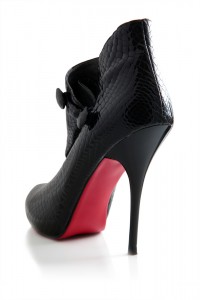Dong v. Holder, US 1st Cir. (10/3/12)
Government & Administrative Law, Immigration Law
 This case required the First Circuit Court of Appeals to decide, for the first time, whether section 1101(a)(42)(B), a statute enacted to pave the way for asylum for victims of China’s coercive population control policies, extends automatically to a spouse of a person forced to undergo an abortion. Petitioner, a Chinese national, petitioned for asylum, seeking to remain in the United States because of, among other things, his wife’s forced abortion. Petitioner argued he was entitled to per se refugee status under 8 U.S.C. 1101(a)(42)(B) “as a person who has been forced to abort a pregnancy.” The immigration judge rejected this argument, and the board of immigration appeals affirmed. The First Circuit Court denied Petitioner’s petition for judicial review after joining several of its sister circuits in holding that, given the language of the relevant statute and the Attorney General’s reasonable interpretation of it, the agency did not err in refusing to grant Petitioner’s per se refugee status on the basis that the Chinese government had compelled his wife to undergo a forced abortion.
This case required the First Circuit Court of Appeals to decide, for the first time, whether section 1101(a)(42)(B), a statute enacted to pave the way for asylum for victims of China’s coercive population control policies, extends automatically to a spouse of a person forced to undergo an abortion. Petitioner, a Chinese national, petitioned for asylum, seeking to remain in the United States because of, among other things, his wife’s forced abortion. Petitioner argued he was entitled to per se refugee status under 8 U.S.C. 1101(a)(42)(B) “as a person who has been forced to abort a pregnancy.” The immigration judge rejected this argument, and the board of immigration appeals affirmed. The First Circuit Court denied Petitioner’s petition for judicial review after joining several of its sister circuits in holding that, given the language of the relevant statute and the Attorney General’s reasonable interpretation of it, the agency did not err in refusing to grant Petitioner’s per se refugee status on the basis that the Chinese government had compelled his wife to undergo a forced abortion.
Read More:
First Circuit: No Automatic Asylum for Chinese Men in Abortion Cases, Wall Street Journal
U.S. v. Tasis , US 6th Cir. (10/4/12)
Government Contracts, Health Law, Public Benefits, White Collar Crime
Tasis and his brother ran a sham medical clinic, recruited homeless Medicare recipients who had tested positive for HIV, hepatitis or asthma, paid the “patients” small sums in exchange for their insurance identification, then billed Medicare for infusion therapies that were never provided. During four months in 2006, the Center billed Medicare $2,855,785 and received $827,000 in return. The scheme lasted 15 months, during which Tasis and his collaborators submitted $9,122,159.35 in Medicare claims. An auditor notified the FBI. After an investigation, prosecutors indicted Tasis on fraud and conspiracy claims. Over Tasis’s objection, co-conspirator Martinez testified that she and Tasis had orchestrated a a similar scam in Florida. The court instructed the jury to consider Martinez’s testimony about the Florida conspiracy only as it related to Tasis’s “intent, plan and knowledge.” The jury found Tasis guilty, and the trial judge sentenced him to 78 months in prison and required him to pay $6,079,445.93 in restitution. The Sixth Circuit affirmed, rejecting various challenges to evidentiary rulings.

 Defendant, a crematory operator, hid hundreds of uncremated bodies on his property rather than perform cremations he was paid to do. When Plaintiffs, who had received what they thought to be their deceased son’s cremains from Defendant’s crematory, learned about the problems at the crematory, they discovered the body of their son was mishandled and not properly cremated. Plaintiffs sued Defendant for the alleged mishandling of their deceased son’s body. Following a jury verdict for Plaintiffs, the trial court entered judgment against Defendant based on the intentional infliction of emotional distress claim but granted his motion for a judgment notwithstanding the verdict on Plaintiffs’ Tennessee Consumer Protection Act (TCPA) and bailment claims. The court of appeals affirmed. The Supreme Court affirmed, holding that the trial court did not err in (1) holding Defendant liable for intentional infliction of emotional distress in the amount of the jury verdict; (2) instructing the jury that they were permitted to draw a negative inference resulting from Defendant’s invocation of his Fifth Amendment privilege during questioning; and (3) dismissing the TCPA and bailment claims.
Defendant, a crematory operator, hid hundreds of uncremated bodies on his property rather than perform cremations he was paid to do. When Plaintiffs, who had received what they thought to be their deceased son’s cremains from Defendant’s crematory, learned about the problems at the crematory, they discovered the body of their son was mishandled and not properly cremated. Plaintiffs sued Defendant for the alleged mishandling of their deceased son’s body. Following a jury verdict for Plaintiffs, the trial court entered judgment against Defendant based on the intentional infliction of emotional distress claim but granted his motion for a judgment notwithstanding the verdict on Plaintiffs’ Tennessee Consumer Protection Act (TCPA) and bailment claims. The court of appeals affirmed. The Supreme Court affirmed, holding that the trial court did not err in (1) holding Defendant liable for intentional infliction of emotional distress in the amount of the jury verdict; (2) instructing the jury that they were permitted to draw a negative inference resulting from Defendant’s invocation of his Fifth Amendment privilege during questioning; and (3) dismissing the TCPA and bailment claims. Petitioner, a death row inmate, appealed the district court’s denial of his petition for writ of habeas corpus brought pursuant to 28 U.S.C. 2254. Petitioner contended that he was denied a fair trial by an impartial judge and unbiased jury because the jury gave the judge and the bailiff inappropriate gag gifts at the conclusion of the trial. Petitioner also contended that there was racial discrimination in the selection of the jury. The court held that it was not unreasonable for the Georgia Supreme Court to find that petitioner did not prove purposeful discrimination by the state in the selection of the jury. The court also held, without condoning the regrettable behavior of either, that both the jury and the judge remained impartial and unbiased throughout the trial. Accordingly, the court affirmed the district court’s denial of habeas relief.
Petitioner, a death row inmate, appealed the district court’s denial of his petition for writ of habeas corpus brought pursuant to 28 U.S.C. 2254. Petitioner contended that he was denied a fair trial by an impartial judge and unbiased jury because the jury gave the judge and the bailiff inappropriate gag gifts at the conclusion of the trial. Petitioner also contended that there was racial discrimination in the selection of the jury. The court held that it was not unreasonable for the Georgia Supreme Court to find that petitioner did not prove purposeful discrimination by the state in the selection of the jury. The court also held, without condoning the regrettable behavior of either, that both the jury and the judge remained impartial and unbiased throughout the trial. Accordingly, the court affirmed the district court’s denial of habeas relief. Christian Louboutin, a fashion designer best known for his use of red lacquer on the outsole of the shoes he designs, appealed the district court’s order denying a motion for preliminary injunction against alleged trademark infringement by Yves Saint Laurent (YSL). The court concluded that the district court’s conclusion that a single color could never serve as a trademark in the fashion industry was inconsistent with the Supreme Court’s decision in Qualitex Co. v. Jacobson Products Co., and that the district court therefore erred by resting its denial of Louboutin’s preliminary injunction motion on that ground.
Christian Louboutin, a fashion designer best known for his use of red lacquer on the outsole of the shoes he designs, appealed the district court’s order denying a motion for preliminary injunction against alleged trademark infringement by Yves Saint Laurent (YSL). The court concluded that the district court’s conclusion that a single color could never serve as a trademark in the fashion industry was inconsistent with the Supreme Court’s decision in Qualitex Co. v. Jacobson Products Co., and that the district court therefore erred by resting its denial of Louboutin’s preliminary injunction motion on that ground. Petitioner was found guilty of the murders of two brothers. The trial court sentenced Petitioner to death. The Supreme Court affirmed. Petitioner subsequently filed a habeas corpus petition for relief from the judgment of death. The Supreme Court ordered an evidentiary hearing on Petitioner’s claim that the prosecution had failed to disclose evidence that would have supported a case in mitigation at the penalty phase that Petitioner committed the two murders because of a Colombian drug cartel’s death threats against him and his family. The referee found merit to Petitioner’s claim. The Supreme Court upheld the determination by the referee and granted Petitioner’s habeas corpus petition, holding (1) substantial evidence supported the referee’s determination, and (2) it was reasonably probable that Petitioner’s penalty phase jury would have returned a verdict of life imprisonment without parole had it heard the evidence withheld by the prosecution.
Petitioner was found guilty of the murders of two brothers. The trial court sentenced Petitioner to death. The Supreme Court affirmed. Petitioner subsequently filed a habeas corpus petition for relief from the judgment of death. The Supreme Court ordered an evidentiary hearing on Petitioner’s claim that the prosecution had failed to disclose evidence that would have supported a case in mitigation at the penalty phase that Petitioner committed the two murders because of a Colombian drug cartel’s death threats against him and his family. The referee found merit to Petitioner’s claim. The Supreme Court upheld the determination by the referee and granted Petitioner’s habeas corpus petition, holding (1) substantial evidence supported the referee’s determination, and (2) it was reasonably probable that Petitioner’s penalty phase jury would have returned a verdict of life imprisonment without parole had it heard the evidence withheld by the prosecution. The selections from our
The selections from our